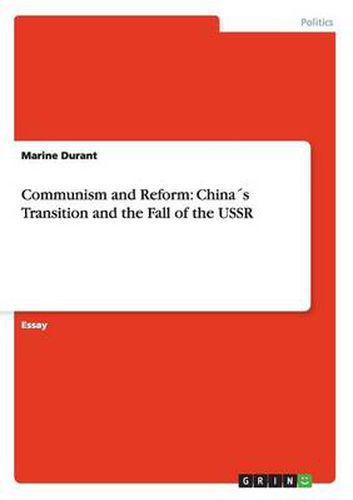Readings Newsletter
Become a Readings Member to make your shopping experience even easier.
Sign in or sign up for free!
You’re not far away from qualifying for FREE standard shipping within Australia
You’ve qualified for FREE standard shipping within Australia
The cart is loading…






Essay from the year 2011 in the subject Politics - International Politics - Topic: History of Inernational Relations, grade: -, Grenoble Ecole de Management, course: Affaires internationales, language: English, abstract: The 1980s was a turbulent decade for communism. By the onset of the 1990s the two dominant communist powers, the Union of Soviet Socialist Republics and the People’s Republic of China, had been completely transformed by reforms, straying far from their socialist roots. While the PRC would manage to weather the decade of reform, in December 1991 the USSR was officially dissolved, having collapsed under internal pressures. The key focus of this essay is to provide possible explanations for why the Soviet Union fell apart and the PRC did not. Both countries had been founded under Marxist-Leninist principles, and the Soviet Union was arguably Mao’s primary inspiration for the establishment and organization of the PRC. While a great many differences existed between the PRC and the USSR, the simultaneous attempts at market reform in the two countries demand an explanation for their outcomes. No definitive answer or explanation may be possible, and the numerous differences between the PRC and the USSR, among them differences in history, culture, leadership and method, all contributed to steering the countries towards different conclusions. This paper explores some of the larger, more important distinctions that were central to forming the divergent paths of each country.
$9.00 standard shipping within Australia
FREE standard shipping within Australia for orders over $100.00
Express & International shipping calculated at checkout
Essay from the year 2011 in the subject Politics - International Politics - Topic: History of Inernational Relations, grade: -, Grenoble Ecole de Management, course: Affaires internationales, language: English, abstract: The 1980s was a turbulent decade for communism. By the onset of the 1990s the two dominant communist powers, the Union of Soviet Socialist Republics and the People’s Republic of China, had been completely transformed by reforms, straying far from their socialist roots. While the PRC would manage to weather the decade of reform, in December 1991 the USSR was officially dissolved, having collapsed under internal pressures. The key focus of this essay is to provide possible explanations for why the Soviet Union fell apart and the PRC did not. Both countries had been founded under Marxist-Leninist principles, and the Soviet Union was arguably Mao’s primary inspiration for the establishment and organization of the PRC. While a great many differences existed between the PRC and the USSR, the simultaneous attempts at market reform in the two countries demand an explanation for their outcomes. No definitive answer or explanation may be possible, and the numerous differences between the PRC and the USSR, among them differences in history, culture, leadership and method, all contributed to steering the countries towards different conclusions. This paper explores some of the larger, more important distinctions that were central to forming the divergent paths of each country.